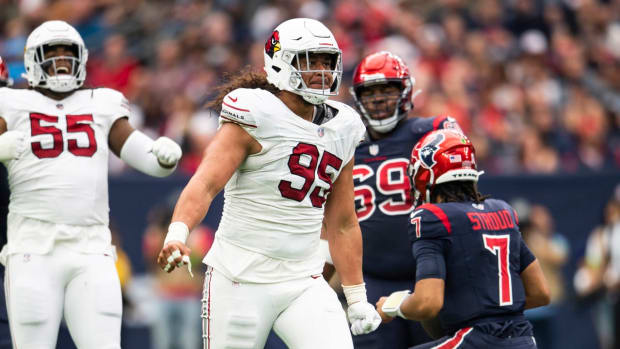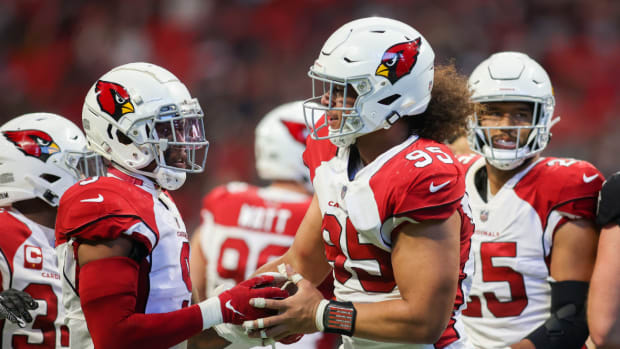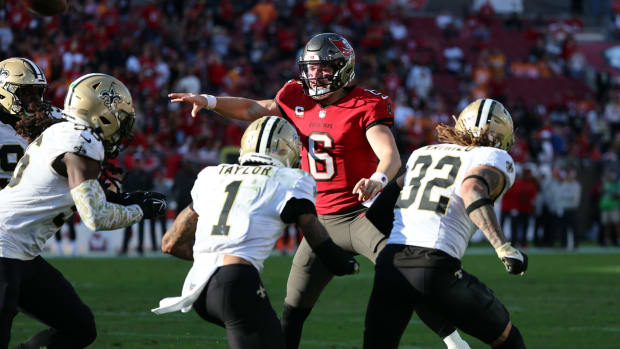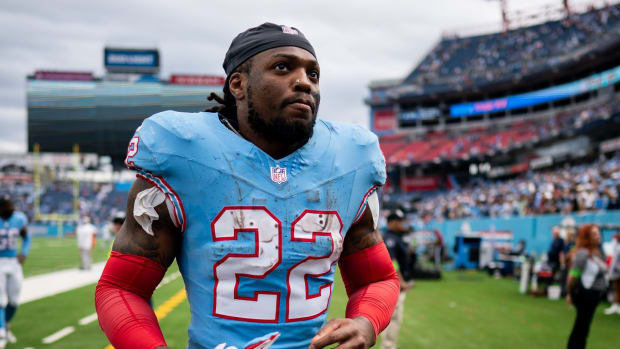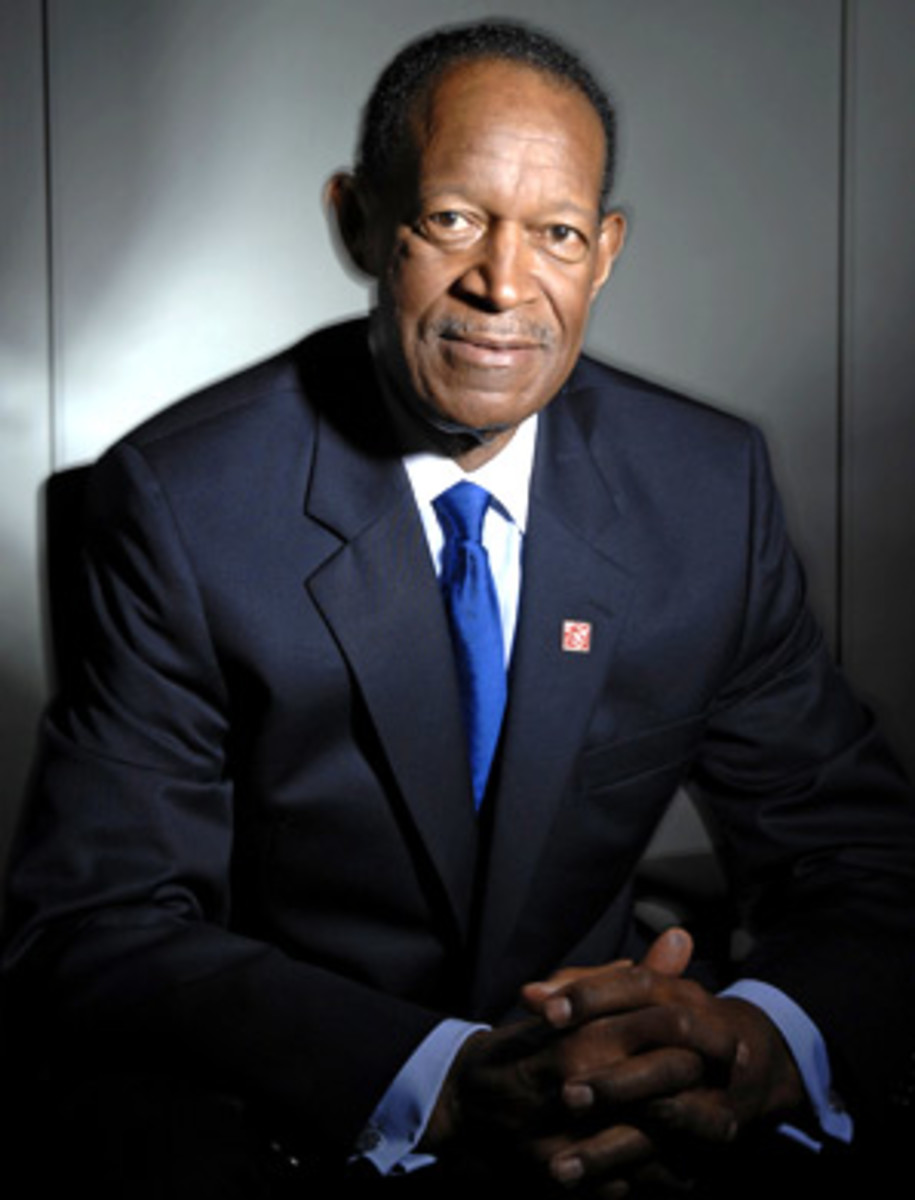
Gene Upshaw: 1945-2008
Of course, death could have him as it could have any man: any way it wanted. But an odd thing happened last week once it entered that big house, Gene Upshaw. Death became him.
Secretive. Abrupt. Adamant.
Accidents and heart attacks have whisked major sports figures off the stage more suddenly than the exit of the executive director of the NFL Players Association and Hall of Fame guard. But has disease ever taken one with such swiftness and stealth?
As stunned as his loved ones, friends, colleagues and adversaries were, they recognized death's eerie mimicry of his life. Some remembered those Saturday nights at his dinner table, talking and laughing over coffee and tequila, when the NFL legend would go off to do the dishes, return and announce that the party was over -- then turn out the lights. Some had been dancing at Super Bowl bashes when he'd pull out his car keys and bolt, leaving them to scramble after him or be stranded. Others had been at the negotiating table with him when he smelled something foul, fell silent, arose and walked out. When Gene Upshaw decided it was time to go, he went. He didn't say goodbye.
He went last Wednesday night, in the ICU at Tahoe Forest Hospital. Paul Tagliabue, the former NFL commissioner and friend who'd partnered with Upshaw to restructure the league's economics and usher in an era of fantastic wealth, awoke in a fog to the news at 1 a.m. on Thursday and issued a statement hours later declaring that few players in history had had Upshaw's impact on the NFL. Then the shock and fog began to clear. "And I sat there all day thinking, Who else is in that few?" said Tagliabue. "I didn't want to say no one else has ever had that impact. But it may be no one. Gene was the sun and the moon and Venus and Jupiter and Mars. It takes awhile, you know, to replace them in a constellation."
Tagliabue hadn't seen Upshaw in a few months, but he'd heard the whispers. Weight was melting off the big man who'd ruled the NFLPA for a quarter century. Plenty of people were pointing it out to Gene, including Steelers owner Dan Rooney at the Hall of Fame gathering three weeks ago in Canton. But he'd just shrug it off, and their acquaintance with Upshaw's iron will -- the one banana and five coffees that carried him till dinner, the four or five miles he pounded out on a treadmill while the rest of Washington, D.C., lunched -- made them hesitant to press the point. Yes, he looked weary, but few executives on earth worked longer hours, and Upshaw was not a man to be pressed. And yes, his back had begun to ache, enough to pull out of the American Century Celebrity Golf Championship a few weeks ago, but what 62-year-old's didn't? Dr. Thom Mayer, the NFLPA's medical director as well as a friend, advised him to get tests but didn't waste his breath when Gene decided to wait until after his annual August family vacation at his second home in Truckee, Calif., near Lake Tahoe. In Upshaw's entire NFL career, 15 years of trench savagery, he never once came out of a game.
On the night of Aug. 15, a Friday, he celebrated his 63rd birthday in Tahoe, and the resonance that number held wasn't lost on him. That was the license-plate number that linebackers and cornerbacks looked up and saw rumbling away after Upshaw -- a mastodon four decades ago at 6' 5", 265 -- had flattened them as he led sweeps for perhaps the greatest offensive line in NFL history. "Highway 63," his teammate, Raiders running back Mark van Eeghen, used to call the left-side swath that the snorting seven-time Pro Bowl player would blaze, his big Afro and beard about to burst right through that battered silver helmet, his long, pumping arms -- encased in four rolls of tape -- about to club anything left twitching.
"Number 63 turned 63," Gene kept chortling on that Friday night. Then he lay down in bed, and his breaths grew short, and the symmetry grew grim.
It took a day for his wife and Dr. Mayer, on the phone from the East Coast, to prod him to the emergency room. On Sunday morning he relented. He'd watched death gnaw at his father for two decades, taking piece after piece of both of the old man's legs in a series of amputations to stave off complications caused by diabetes, infections and congenitally thin veins. He'd watched Eugene Sr., without a murmur, drive himself to the hospital to get more of his legs sawed off, then go home, slide under his car and change the brakes... until a Christmas Eve stroke finally took him out at 74. On Sunday evening at Tahoe Forest, when blood tests and scans indicated that Gene had cancer, and that it had already metastasized to his liver and lower intestines, there was neither flinch nor complaint. He'd learned young the folly of that: As the seven-year-old picking cotton from dawn to dusk all summer at a buck-twenty-five for each 100 pounds under the merciless glare of the Texas sun and the father waiting at home to tally his production. As the 20-year-old crawling through the darkness, muck and coiling pipes inside a 50-yard-long oil-field cooling tower to clean out the chemicals, oil and mud, advancing six grim feet a day for the entire summer.
What kind of cancer had he contracted? What sort of treatment would begin once the big man could be flown back to his home in northern Virginia, hopefully by early this week? He was moved from the ER to a hospital room at Tahoe Forest, checking in -- Upshawish to the end -- under an assumed name. Surrounded by his wife, Terri, and three sons, Eugene III, Justin and Daniel, he remained awake and as matter-of-fact as macadam as tests continued the following day. He may not have uttered one of his renowned Texas country nuggets, but you could almost hear him thinking it: "You can wish in one hand and s--- in the other, and see which one fills up."
Not a peep of his condition trickled to the media or to his home office in Washington, the skeletally staffed outfit he'd inherited in 1983. But what else was new? Upshaw was a relic executive, little concern for p.r. and less for transparency: a sealed vault. What he hadn't learned about tight lips from his old man, he'd gotten a doctorate in from his next mentor, the sultan of secrecy, Raiders owner Al Davis. All these years after working his way up the NFLPA ranks -- from player rep to president to executive director -- Gene still fetched his own coffee, photocopies and faxes, fixed his own office toilet, booked his own hotels and rental cars, left his staff in the dark about his whereabouts, rarely answered his cellphone and mentioned nothing about his work when he trudged home at 9 p.m., often to cook his own dinner. He was the ultimate Big Daddy, the provider who loved to serve friends, family and his 1,696-player constituency without flourish, acclaim or questioning. His generosity toward widows and orphans of former players, personal checks written and slipped into palms, went undeclared too. "I know where I'm going, but I don't explain," he'd say. "If you're too open, then everyone will find something wrong with everything. They'll get a finger in the pie."
That got him into trouble, deep trouble, with a group of loud retired players who didn't like their slice of the disability and pension pies and didn't like Gene's slice -- with bonuses, Upshaw's 2006 income was reported as $6.7 million. It landed him in front of a congressional hearing last September and landed him in a media firestorm that had just begun to diminish in recent months with a series of new safety nets installed to catch the old warriors who'd stumbled into free fall. And maybe even -- those who could only imagine the stress he'd swallowed over the last two years might wonder -- landed him here at Tahoe Forest with a gutful of cancer.
By Monday night, his second night in the hospital, doctors were almost certain they had I.D.'d their enemy: the most vicious of all, the one known as the silent disease, pancreatic cancer. The one that attacks, on average, 37,680 people a year in the U.S.... and kills 34,290 of them. Where was the yellowing of his skin and eyes that normally accompanied this cancer? The searing abdominal pain? If Gene had felt it, he'd let no one know it. But even if he'd submitted to testing a month or two earlier, his doctors knew, it would've made little difference.
He remained awake and cognizant on Tuesday, still talking to his wife, children and another visitor, Marvin, one of two younger brothers with whom he'd shared a bedroom in the little house in Robstown, Texas, where they'd grown up with no running water. Marvin, brimming with piss and vinegar and an early growth spurt, had been the family's high school football star, the defensive lineman that 5' 10" Gene -- on the jayvee team until his senior year -- had had to watch from the sideline as he toted the first-down chains.
But then Gene spurted -- six inches and 50 pounds -- at Texas A&I, where the football coach talked him into trying out for the team, and late-blossomed into a 1967 first-round draft choice. Throughout the Upshaw brothers' football life, from inter-squad high school scrimmages to their college and pro rivalries, Marvin would tap a teammate on the tail, motion him over so he could line up across from big brother Gene and tee off on him before the whistle, still failing in his 30s to get the goat of his unflappable older brother. "You never get that privilege," Gene would say.
That's the trait that took him from the cotton field to terrain no other athlete had ever reached. He personalized nothing. He measured three times before he cut. He grasped how each issue leaned on other issues, and so it was always him at the eye of the storm, waiting for the radical reps to finish ranting and then laying out a plan that reeled them to the center. That's how he'd ruled, through the strikes in 1982 and '87 when the association was in tatters, to the end around he called in '91, when his decision to decertify the union stripped owners of their antitrust exemption and pressured them to cut a deal -- the most lucrative one for players in all of sports, a 60% slice of revenues and unfettered free agency in exchange for a salary cap. That's how he led a group of headstrong men, 60% of them black, through the castle walls built by 28 white multimillionaire owners. That's how he'd ended up sitting on the armrest of the throne of commissioner Tagliabue and his replacement, Roger Goodell. They were partners divvying up a pie that expanded astronomically as TV executives became assured of long-term labor peace -- a tad too knee-to-knee for those hobbling retired players who screamed that Upshaw had abandoned the adversarial perch to which he'd been elected.
Tuesday night came. The orderlies shuttling in and out of his room, no doubt, already loved him. For all his clamped teeth when it came to feelings and union matters, Upshaw was renowned for his chattiness with the doormen and dishwashers, the folks just squeezing by. And then, with plans beginning to be made for his return home to Virginia and the ensuing chemotherapy regimen, the disease -- like a housebreaker rifling through the electrical box and shutting off breakers -- advanced with shocking speed on Wednesday. There went the kidneys. Then the liver. Then the heart.
Just like that. The only man to play in Super Bowls in three decades. The only man to start in championship games in the AFL and the NFL. The most influential black labor leader in America and the only athlete to later take the reins of his sports union. Gone. Upshaw's half-dozen lead lieutenants back at the home office, clueless that he was even ill, shuddered with disbelief last Thursday morning when official word came.
"Two days [from diagnosis to death] is a record," said Miki Yaras-Davis, who has charted plenty of fatal diseases as the union's director of benefits, "but that man was always setting records."
It was as if, once he got the word, he'd drawn up a game plan, said Dr. Mayer, "and said, 'This is how a man dies.' "
With one drawback: Upshaw hated to leave behind any clutter; his desk spotless at the end of every workday, his kitchen stainless at the close of every dinner party. But he'd arranged for no successor to confront the lawsuit filed by disgruntled former players Bernie Parrish and Herb Adderley over dispersal of Players' Inc. funds, or the far larger storm clouds on the horizon -- the recent decision by owners remorseful over their 40% slice to opt out of the collective bargaining agreement in 2010. Inside that sealed vault had lain a five-decade archive that no one could remotely replicate.
Richard Berthelsen, the union's general counsel hastily named interim executive director, will most likely see the CBA crisis through for two years, and then...? Troy Vincent, the retired cornerback and former union president? Trace Armstrong, the retired defensive end and an ex-union president as well?
All that will be put aside until Gene Upshaw's large life is commemorated this week in Washington, D.C. The redwood felled before anyone ever heard the saw.


































